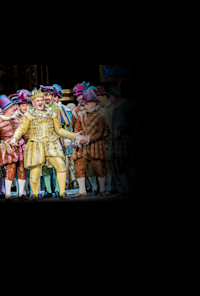Rigoletto is a spectacle that has been going on for 24 years on the stage of the National Opera, with sumptuous decorations by the legendary Ezio Frigeria and historical costumes designed by Franca Squarciapino. It is a dazzling procession of spectacular images that allow the viewer to move in their imagination to Renaissance Mantua, where the action of the wonderful opera by Giuseppe Verdi takes place.
Rigoletto is Verdi 's first completed masterpiece - capolavoro assoluto . Witnesses of the world premiere, which took place in the Venetian theater La Fenice on March 11, 1851, had no doubts about it. However, the success came at the cost of the composer's exhausting conflict with Austrian censorship (Venice was ruled by the Habsburgs at that time), which he could have expected in advance, reaching for the forbidden anti-soviet drama by Victor Hugo, Król się amobie ( The King of the Fun).(1832). However, Verdi succumbed to the purely theatrical values of this play, and having a unique sense of the stage effect, he decided to listen to his intuition. He merely obliged the librettist Francesco Maria Piave to be very careful. But it was to no avail. Censorship, known as the "Imperial-Royal Directorate of the Central Public Order", having read the libretto, issued an absolute ban on staging a work it deemed "immoral". The King of France, Francis I, was shown by Victor Hugo as a dishonest lecher who cynically seduces ladies of the court and girls from the people.
The fact that the premiere of Rigoletto took place on the set date was due to Verdi to the kindness of the director of the Venetian police, Carl Martelli, who agreed to stage the work on the condition that numerous changes to the libretto were introduced. Martelli also suggested the title - Rigoletto . Such a name, from the French word rigolo - joker, was eventually given to the royal jester Tribulet in the play of Hugo. The action was transferred from France to Renaissance Mantua, and the ruler-podrywacz was "relegated" to the princely title.
There were so many proposals for changes to the libretto that Verdi could not hide his indignation. He expressed it in a letter to a friend so that posterity could trace the genius's thinking. For example, Verdi referred to the final scene of the work - here is the pathetic jester Rigoletto who discovers that the person whom he ordered to murder is not the Duke of Mantua, but his own daughter, the beloved Gilda, seduced by the ruler. “I don't understand why the bag is removed. What does this bag mean for the police? After the bag is removed, who will believe that Rigoletto speaks to the corpse for half an hour until lightning discovers that it is his daughter? " Said Verdi.
In the end, the bag in question remained in the opera's action, as did many other details of the libretto that initially aroused police reservations. Fortunately for the play, because in terms of musical dramaturgy, Rigoletto is a masterpiece, also due to the brilliant instrumentation (the orchestra suggestively illustrates the emotional states of the characters). It was from this opera that the famous aria of the Prince, " A Changeable Woman , is perverse," because it flows from the mouth of an exceptionally changeable man. It is also home to one of the most beautiful and timeless vocal quartets in operatic literature, in which each of the characters - Rigoletto, Gilda, the Prince and the innkeeper Maddalena - express their own mood.
Anyone who hears Rigoletto will never forget this music.










